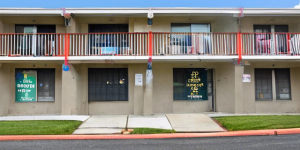
Low Income Apartments Accepting Section 8 Near Me
Finding an affordable rental apartment can be challenging, especially for low-income households relying on a Section 8 housing choice voucher. Luckily, many quality landlords accept Section 8 tenants and provide comfortable homes nationwide. Let’s explore expert tips for locating apartments welcoming voucher holders like yourself nearby.
Understanding Section 8 Rental Assistance Basics
First, a quick primer on how the Section 8 program functions to contextualize the rental search process:
Federal Rental Subsidies For Qualified Applicants
Section 8 provides rent support vouchers allowing very low-income families, seniors, and disabled individuals to lease private market apartments charging below Fair Market Rent rates determined for their area.
Tenant Rent Portions Capped At 30% Of Income
Your out-of-pocket rental contribution is typically ~30% of your monthly income. The housing authority pays the additional amount directly to landlords.
Meet Income Limits And Other Requirements
Households must fall under income thresholds and meet voucher eligibility rules regarding citizenship status, criminal histories, eviction records, etc.
Locating Landlords Accepting Section 8 Vouchers In Your Area
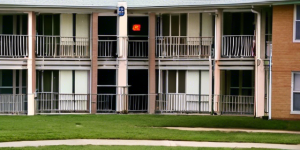
Low Income Apartments Accepting Section 8 Near Me
So how do you pinpoint available rentals and receptive landlords welcoming voucher holders like yourself?
Check Government Affordable Housing Databases
AffordableHousing.com and GoSection8.com let you filter statewide or metro-level rental listings by “Section 8 accepted” unit amenities, rent amounts, property types and more.
Search Section 8 Specific Online Listings Sites
Websites like GoSection8, SocialServe.Com and AffordableHousingOnlinecater specifically to voucher holders, with thousands of properties pre-screened for Section 8 eligibility.
Consult Your Housing Authority
The public housing authority (PHA) issuing your voucher maintains lists of registered Section 8 landlords across neighborhoods awaiting voucher tenants.
Drive Or Walk Around Desirable Neighborhoods
Check for “Section 8 Welcome” signs on apartment buildings while exploring ideal target communities. Jot down leasing office numbers or snap rental photos so you remember appealing options worth pursuing later on.
Evaluating Section 8 Friendly Apartment Listings
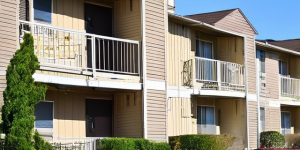
Low Income Apartments Accepting Section 8 Near Me
As listings emerge in your rent range near desired amenities, assess each carefully:
Confirm Voucher Payment Standards Alignment
Double check that a unit’s asked rent falls within your voucher’s payment standards, factoring in utilities costs and any allowable adjustments.
Cross-Reference Area Crime Statistics
Research area crime rates on websites like NeighborhoodScout to determine personal safety, especially if you have children who will play outside.
Call To Confirm Application Requirements
Touch base with leasing agents directly to clarify exactly what documents, fees, tenant background checks to expect through their rental application process.
Schedule In-Unit Viewings
Nothing replaces seeing amenities, space proportions, condition and quality firsthand! Photos can hide issues. Visit multiple units before applying.
Drive The Surrounding Community
Get a feel for the walkability, public transit access, nearby grocery options, proximity to schools/parks to ensure the neighborhood suits your family’s lifestyle.
Appealing To Landlords As A Section 8 Voucher Holder
Fair housing laws mean landlords can’t automatically deny your application due to the voucher. However, impressing property owners gives a competitive advantage, especially in tight rental markets.
Highlight Steady Section 8 Income
Emphasize how the stable housing assistance voucher payments essentially guarantee on-time monthly rents, worth prioritizing over other applicants.
Prepare All Required Documents
Pull together ID, income, credit, reference and background check files so your application proceeds smoothly without hassling the landlord chasing paper trails.
Offer Multi-Month Security Deposits
Proposing an extra security deposit equal to 2 or 3 month’s rent signals good faith security against property damages.
Volunteer For Credit + Background Checks
Being upfront inviting credit checks and tenant screenings demonstrates you have nothing to hide.
Refer Strong Past Landlord References
Glowing references vouching for your conscientious rental history gives landlords added confidence.
Questions To Ask Landlords Before Signing A Lease
Clarifying expectations in advance positions everyone for positive ongoing tenant-landlord communications. Key topics to cover include:
Are Any Unit Renovations/Repairs Planned?
Understand any planned appliance, flooring or fixture upgrades so you know what to expect unit condition-wise long term.
What Are Reasons For Eviction According To Your Policies?
Get clarity on late rent timelines, noise violations, guest policies and other priority house rules through the landlord’s perspective upfront.
Who Handles Emergency Maintenance Requests After Hours?
Ask how overnight or weekend repairs dispatch to a trusted on-call handyman or service company.
What Payment Methods Do You Accept For Rent + Fees?
Inquire about using secure options like direct debit, wires or checks to pay any out-of-pocket rental portions that are your responsibility.
How Do You Prefer We Communicate Regarding Lease Issues?
Cover the preferred methods and response times for managing lease questions or concerns arising once you move in.
FAQs: Section 8 Rentals Near Me
What documents will I need to provide for apartment applications under Section 8?
Typical documents include 2 recent pay stubs, tax returns, 6 months of bank statements, a copy of your voucher, social security cards for your family, a government-issues ID, birth certificates for dependents, plus collection letters or past rental ledgers if applicable.
How long does it usually take to get approved by landlords for a unit?
Timeframes vary greatly by property management company and market demand—anywhere from three days to a couple of weeks if credit/background checks are backlogged. Follow up if your application sits longer than 10 days.
Can I choose any rental listing or do units require Section 8 approval first?
You can only rent vouchers in units already registered through local housing authorities as participating in Section 8 programs—otherwise applications automatically get denied.
What costs am I responsible for besides my income-based rental portion?
You’ll owe the security deposit, a utility hook-up fee if required, utilities costs above the voucher’s approved allowance and any charges for damages beyond normal wear and tear.
Can landlords double my rent once the 12-month lease ends?
Rent increases on lease renewals face restrictions under Section 8. Generally only small incremental bumps (~5%) aligning with area median rents get approved by the housing authority.
Conclusion
In closing, locating an apartment suited for your family amongst Section 8 listings just requires targeted search strategies across the right databases, tailored communications reassuring quality landlords, plus thorough discussions clarifying move-in expectations. Lean on housing authority resources each step and you’ll be moving into affordable subsidized housing solutions enhancing not only your peace of mind but also quality of life. Best of luck securing rental assistance vouchers and securing wonderful apartments supporting household stability for years to come!
]]>
Foreclosed Homes For Sale Near Me Under $100k
Foreclosed homes can be excellent deals for homebuyers on a budget. With some fixer-uppers going for under $100k, you may be able to score your dream home for a fraction of what it would normally cost. Let’s explore tips for finding and buying a foreclosed home under $100k near you.
Identifying Foreclosures In Your Area

Foreclosed Homes For Sale Near Me Under $100k
The first step is identifying potential foreclosure listings in your desired area. According to RealtyTrac, over 560,000 U.S. properties entered some stage of foreclosure in 2022. Here’s how to pinpoint ones near you:
Check Foreclosure Listing Sites
Websites like RealtyTrac and Homes.com let you browse for pre-foreclosure, auction, and bank-owned listings nationwide. Filter by $100k or under and your target ZIP code to see options in your area.
Drive Neighborhoods Looking For Signs
Some foreclosures won’t be marketed online. Check areas you’d like to buy in for yard signs indicating a foreclosure sale. Jot down any relevant listing info so you can research them later.
Contact Local Real Estate Agents
Many agents specialize in foreclosure listings. A 2022 NAR survey found 36% of agents’ transactions involved foreclosures. Ask agents about any upcoming foreclosure auctions or bank-owned discounts under $100k.
Assessing Viability Of Sub-$100k Foreclosures
Once you’ve identified potential $100k or less foreclosure opportunities nearby, you need to decide if they’re worth pursuing.
Research Past Listing Details
Check a property’s listing history on sites like Zillow to find the prior sale amount and year – this gives insight into its condition and real market value.
Drive By The Home
Do a quick drive-by viewing of curb appeal, structure condition, neighborhood quality and any visible issues. For interiors, some listings let agents or buyers do walkthroughs prior to auction.
Check Comparable Sales
Look up what similar nearby homes have sold for to gauge if the foreclosure is seriously undervalued. Account for its repair needs in comparison.
Consult With An Inspector
For properties you’re serious about, you could arrange an $100-$400 inspection to assess required fixes like roofing, electric and plumbing prior to bidding. Then adjust your offer cost accordingly.
Bidding Strategically At Foreclosure Auctions
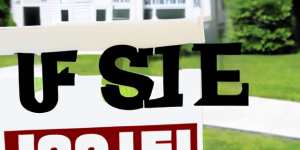
Foreclosed Homes For Sale Near Me Under $100k
Foreclosure auctions require strategic bidding to avoid overpaying while still beating out competitors all trying to score a deal.
Research Auction Details Thoroughly
Learn all auction terms, procedures, and property specifics so you can develop an informed bidding approach without surprise hurdles.
Set A Maximum Bid Threshold Based On Repair Costs
Have a clear top dollar limit aligned with your total budget – purchase amount plus estimated repair expenses. Stick firmly to this threshold during bidding wars.
Explore Financing Options Beforehand
Get preapproved for a mortgage, home equity loan or line of credit you can leverage for auction down payments, so you’re ready to bid quickly.
Attend In Person If Possible
Onsite bidding can help you react faster to competing offers and determine others’ limits compared to online or proxy bidding.
Have Contingency Plans If You Lose
If someone else wins that dream house, be ready to move forward. Have back-up auction prospects lined up or pivot to more traditional listings.
Navigating Buying Bank-Owned Foreclosures

Foreclosed Homes For Sale Near Me Under $100k
Purchasing bank-owned foreclosures (REO properties) has some unique advantages for discount home shoppers.
More Flexible Financing Options
Banks often offer special first-time homebuyer programs, low down payments or reduced Interest rates to sell REOs faster. Discuss these deals with loan officers.
Negotiate Repair Credits Or Discounts
Many REOs have accumulated deferred maintenance or outdated finishes. Use professional inspection results detailing fix-up costs to request repair credits or an overall lower purchase price from the selling bank.
Take Advantage Of As-Is Pricing
Buying properties on an “as-is” basis waives rights to request repairs from the seller. But this allows you to purchase well below actual resale value, budgeting renovation expenses yourself later on.
Don’t Let Cosmetics Overshadow Opportunity
Look past the ugly paint colors, worn carpets and overgrown lawns common in REOs to recognize an underlying structurally-sound property with cozy spaces and great locality at a very affordable investment.
Important Repairs To Budget For In Foreclosure Fixer-Uppers
While some gorgeous foreclosure diamonds just need a little polishing, most under $100k properties require more intensive repairs or overhauls before move-in ready. Common major updates include:
Roof Replacements Or Patch Jobs
Faulty roofs are a common issue. Inspect carefully then plan for full replacements or seals and spot fixes on leaks.
Plumbing & Electrical Rewiring
Outdated plumbing piping and insufficient electrical panels/wiring for modern usage often crop up in older houses. Address these safety issues early on.
HVAC Installations Or Tune-Ups
It’s common to find properties with broken A/C systems or inefficient heating needing upgrades like new energy-efficient equipment.
Kitchen & Bathroom Remodels
Even partially gutting and restoring kitchens/bathrooms with fresh cabinetry, sinks, lighting and flooring goes far in boosting livability and future resale appeal.
Structural Foundation & Wall Repairs
Look for obvious cracks in walls or ceilings, sticking doors/windows and foundation damage then consult structural engineers on necessary fixes.
Staging Foreclosure Listings To Attract Buyers
Cosmetic improvements also deserve budget dollars when rehabbing low-priced foreclosures, enhancing appeal for resale or rental investors. Consider:
Painting Walls/Ceilings With Neutral Colors
Fresh interior paint jobs do wonders breathing beauty into dusty dilapidated rooms, making them glow. Stick with light versatile beige, gray or white shades.
Refinishing Hardwood Flooring
See if worn parquet or oak flooring boards underneath nasty carpeting are salvageable through refinishing. Beautiful wood grain adds natural character.
Updating Light Fixtures And Hardware
Swap out outdated dangling overhead lights or mismatched metal hardware for affordable modern brushed nickel or bronze finishes.
Landscaping Shrubbery And Plantings
Curb appeal matters, so put in some manicured bushes, flower beds, stone paths to hide ugly fencing and brighten the entryway.
Financing Options For Foreclosure Purchases Under $100k
Creative financing opens doors for buying foreclosure bargains under $100k if you don’t have six figures of cash laying around or don’t qualify for traditional loans. Alternatives include:
FHA 203(k) Rehab Mortgages
FHA 203(k) loans offer low down payments and rolled renovation costs at fixed rates, but have borrowing limits and oversight rules.
HomeStyle Renovation Loans
HomeStyle mortgages also bundle purchase prices/repairs with flexible limits and lender oversight options.
Hard Money Or Private Lender Loans
Hard money loans via private individual investors offer quicker approvals and funding without all the red tape, but have higher rates/fees and short 1-year terms before needing refinancing.
0% Credit Card Balance Transfers
If you have excellent credit, consider applying for a 0% promotional APR credit card to finance smaller improvement projects or down payments interest-free for 12-18 months.
Personal Loans Or HELOCs
Personal installment loans or Home Equity Lines Of Credit tap into your other real estate equities or comparative creditworthiness
Purchasing discount foreclosures under $100K comes with unique hurdles. Being prepared helps you navigate them smoothly:
Allowing Extra Time For Contract Approvals
Banks and lenders review offers on bank-owned properties carefully before accepting, often needing more time vs typical 30-day closings.
Competing With All-Cash Bulk Investors
Large real estate investment groups often buy up foreclosures sight-unseen with full-cash bids, pricing out smaller budget buyers. Consider partnering with private lenders to make more competitive offers.
Inheriting Past Due Taxes Or Liens
Make sure to review any outstanding homeowners association dues, city tax bills, mechanic’s liens or penalties now attached to the property’s title which you may now be responsible for.
No Seller Disclosures Or Property History
Unlike traditional listings, buying foreclosures “as-is” waives rights to seller background info on prior issues, legal problems, or land surveys – so investigate thoroughly before committing.
Dealing With Former Occupant Drama
Angry or conniving past owners losing homes through foreclosure could pose headaches like delayed move-outs, property damage, unfinished contractor projects they started but didn’t complete.
No Access For Showings Or Inspections
With out-of-state banks as sellers and vacant properties, getting inside for appraiser valuations, buyer walkthroughs, contractor estimates may be difficult if changing locks isn’t quickly arranged.
FAQs: Buying Sub $100k Foreclosures
Here are answers to some frequently asked questions about purchasing foreclosed homes under $100,000:
What hidden costs or fees should I budget for?
Expect extra expenses like past-due taxes/liens, HOA fees, property repairs, utility security deposits, financing costs, moving/storage, profit loss from flipping longer than planned.
How can I determine accurate property valuations?
Finding true market value info is tougher for foreclosures. Consult past tax assessments, neighborhood comps’ histories, multiple appraiser opinions to estimate appropriately.
Are auctions or REOs better for bargain deals?
Auctions create competitive bid environments that could inflate end-costs while REOs have set listing prices allowing room to negotiate, but less urgency motivating banks to lower numbers.
Should I tackle repairs myself or hire contractors?
Taking minor cosmetic updates on yourself saves money but contract out electrical, plumbing and complex ventures requiring expert skills, insurance policies protecting your investments.
What real estate agents specialize in foreclosures?
The best foreclosure buying agents understand local auction processes, investor rehabbing costs, and have strong ties for accessing bank-owned listings pre-market. Seek referrals from past clients on these experts.
Conclusion
In summary, foreclosures under $100K require research and vision, but are smart plays offering extreme homeowner savings if you strategize purchases wisely. Determining accurate property conditions, creatively financing deals, and timing your bidding approach are all key tactics setting you up for success buying foreclosure homes for 50-75% off full values. Partner with knowledgeable real estate agents and contractors to smoothly navigate fixer upper challenges. Roll up your sleeves and tackle necessary renovations or repairs yourself where possible as well. With some elbow grease and patience finding hidden gem deals, phenomenal sub $100K foreclosure steals awaiting make achieving homeownership dreams very feasible on restricted budgets.
]]>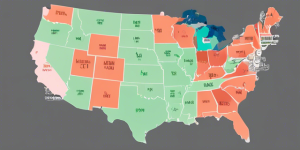
Best States to Buy Rental Investment Property 2024
Real estate investors have historically relied on rental income properties to generate passive revenue and build long-term wealth. As national home values continue rising faster than wages, affordable investment options still exist for those with sufficient capital and savvy. We identified the top state markets poised to deliver positive cash flows in 2024 based on key predictive indicators.
How is 2024 Shaping Up for Rental Property Investors?
The US housing market enters 2024 on uncertain footing as the Federal Reserve battles stubborn inflation through aggressive rate hikes. With mortgage rates double 2021 levels now exceeding 6%, home affordability has plummeted back to 1990 levels. This affects real estate investors in two opposing ways:
1. Purchase Challenge – Higher borrowing costs to obtain loans make it harder to find cash flowing properties that justify acquisition costs and expenses. Investors with all cash or large down payments hold advantage.
2. Renter Demand – As first time homebuyers get priced out of ownership, demand increases for affordable single family rentals and mid-market apartments. Properly screened tenants help offset note rates.
The key is targeting locations where rental demand outpaces supply boosts without insane property valuations. Markets like Boise and Phoenix that exploded in recent years now suffer slowing migration and corrections. Savvy investors should hunt secondary cities offering stability.
What Drives the Best Rental Property Markets?
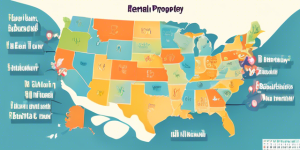
Best States to Buy Rental Investment Property 2024
We assessed over 50 metrics across US cities and states to determine 2024’s optimal rental housing markets. Key selection criteria included:
- Low Unemployment – Employed tenants more likely to pay rents consistently
- ** Rising Wages** – Higher incomes support elevated rents to tenants and investors
- Affordable Pricing – Reasonable property values relative to rents in market
- Millennial Driven – America’s largest adult cohort needs apartments and first homes
- Business Friendliness – Employer and taxpayer friendly climates attract residents
- Future Growth – Economists predict above average expansion ahead
Markets excelling across these demand drivers should sustain smooth occupancy and cash flows for landlords. We also favored state income tax friendly locales for higher net yields.
Top 10 States to Buy Rental Properties 2024
Based on extensive market analytics, we predict these 10 states providing investors the best prospects to procure and profit from rental properties in 2024:
1. Tennessee
Major cities like Nashville and Memphis and smaller ones like Knoxville and Chattanooga feature prominent education and healthcare sector job creators. A popular southern destination for corporate expansions promises more growth ahead. Reasonable property valuations compared to rents persist, especially targeting Class B/C apartments and single family rentals.
Metro Nashville Area 2022 Rent Report
2. Florida
Always a migration magnet, Florida maintains immense appeal as baby boomers retire in droves to popular coastal metros. With no state tax income, Florida also attracts businesses. As single family and condo sales prices soar, rental demand for those unable to buy will heighten. Focus on neighborhoods near services and amenities.
Florida 2022 Rental Market Data
3. Texas
Ubiquitous job creation, especially in Houston and Dallas, accommodates Texas’ rapid population growth. Though home prices and property taxes have jumped in recent years, reasonable values can still be found in San Antonio, Fort Worth, suburban Houston and secondary markets. Avoid speculative plays.
Analysis of Texas Multi Family CRE Market
4. Georgia
Atlanta, Savannah and Augusta demonstrate solid fundamentals like employment and wage gains along with affordable pricing compared to other southeastern cities. Suburban Atlantan apartments, small multi-units and single family rentals should perform well attracting those priced out of owning.
Georgia Apartment Market Rent Forecast 2023
5. North Carolina
North Carolina’s research triangle region continues gaining high paying jobs as workers seek cheaper costs of living than adjacent Virginia and cities further northeast. Look for promising occupancy and rents around Charlotte, Raleigh, Durham and even tourism heavy Asheville as remote work trends persist.
Where are North Carolina Real Estate Markets Heading?
6. Ohio
Midwest affordability lures outsiders to Ohio metros like state capital Columbus, Cincinnati, Cleveland and Toledo. Healthy corporate environments, major universities and renown hospital systems should uphold employment and pay rates for in-demand renters as home prices outpace incomes in desirable neighborhoods.
Ohio Multi Family Commercial Real Estate Performance
7. South Carolina
Traditional value play Charleston continues gaining renown as a dining, arts and tech hub ideal for renters desiring southern charm. Upstate cities like Greenville, Spartanburg and Simpsonville display excellent quality of life to cost ratios. Avoid tourist dependent markets along the Grand Strand as seasonal volatility risk rises.
South Carolina 2023 Real Estate Market Predictions
8. Indiana
The Hoosier State lags its Midwest peer average for property value growth, positioning investors to secure relatively discounted assets in and around Indianapolis, Fort Wayne, Evansville, South Bend and Bloomington – home to Indiana University. Local landlords will benefit as talent stickiness rises.
Indiana Multi Family Market Shows Resiliency
9. Alabama
Fueled by growing aerospace and auto manufacturing presences spread across the state, Alabama delivers exceptional bang for the buck for real estate investors seeking double digit IRRs. Upward momentum should continue even if all markets moderate in 2024.
Birmingham Real Estate 2023 Forecast
10. Kentucky
Kentucky’s largest metro Louisville offers very reasonable single family rents relative to list prices despitesteady buyer demand. And the state’s business friendly policies attract ongoing corporate expansion and relocations providing tenant talent for landlords statewide.
Louisville Realtor Market Predictions 2023
Property Types Offering Top 2024 Returns
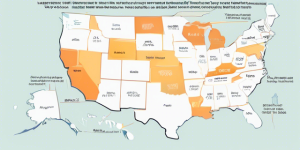
Best States to Buy Rental Investment Property 2024
We expect the following rental asset classes will deliver investors the highest risk-adjusted yields across our favored states this year based on various demand drivers:
Built For Rent Single Family
Private equity funds continue developing entire communities specifically for single family rental use given diminishing affordable for-sale housing inventory across suburban regions. Target metro fringes sporting household formation and income growth.
Class B Value Add Multifamily
Class A properties trading at premium valuations give Class B complexes opportunities to raise rents through interior and exterior facelifts post-acquisition. Priority metros hold high millennial concentrations needing affordable apartments.
Student Housing
While on campus dorms and luxury private accommodations overbuild in recent years, plenty of unrenovated properties near mid-sized universities offer turnaround potential as collegiate enrollments stabilize. Focus more on academics than athletics.
Secondary Market Upstarts
Look beyond the known major metro beneficiaries like Austin and Nashville seeking smaller yet similarly growing cities where asset inflation and regulations haven’t yet erased profit margins for operators and investors.
Blue Collar Single Family Rentals
Even modest 3 bedroom suburban homes with unfinished basements and privacy fenced back yards are becoming unaffordable for local first time buyers employed in lower paying service jobs. Their continued demand props up investment returns.
What to Avoid When Buying Investment Property
While dozens of markets major and minor exhibit positive demographic and asset trends for those acquiring rental housing in 2024, certain property situations remain more risky than advisable:
** Rural Markets**
Persistently negative net migration patterns into remote towns where economic opportunities are declining will fail to deliver tenant demand sufficient enough to offset operating costs and debt. Stick with growth instead of decline.
** Storm Impacted Coastlines**
Despite steep discounts on
properties damaged by recent hurricanes, avoiding additional catastrophe risk in coming years given climatologist predictions of intensifying storm systems makes better sense for conservative passive investors seeking sustainable yields.
** Overheated Appreciation Hubs **
Places like Boise and Phoenix that experienced exponential equity spikes in recent years based chiefly on inbound migration and institutional buying have corrected 20% or more and may further slide as demand retrenches faster than the supply catching up.
** Struggling Metro Office Markets**
Downtowns and urban cores dragged down by the combination of remote work adoption and recession risks should give investors pause as elevated vacancies in both commercial space and nearby apartments linger until reimagined revitalization initiatives gain traction.
** Unproven Alternative Assets**
While more adventurous investors might express interest in newly popular subsets like single family build-to-rent, fractional ownership, short-term furnished rentals or mobile home parks, most industry experts suggest waiting until successful precedents and business models become proven before pursuing.
How are Professional Investors Approaching 2024 Strategies?
In surveying top real estate investment trusts (REITs) and private equity firms who manage billions worth of US rental housing assets, we found most concentrating 2024 buying efforts on Sunbelt metros exhibiting jobs and migration momentum alongside still reasonable property valuations.
Especially alluring are secondary cities where housing affordability increasingly matters more as stock market volatility and recession worries make safety in cash flows paramount. Markets where high rents fully offset higher mortgage expenses should prevail regardless of purchase timing.
When seeking specific assets, those offering light interior cosmetic opportunities allowing operating expenses reductions and subsequent rent lifts are favored. Anything requiring heavy structural improvements or systems overhauls gets passed over for better baseline scenarios.
Investors also aim to retain existing property management infrastructure without interruption during acquisitions given talent shortages. No one wants vacancies occurring when demand still exceeds supply almost everywhere strategic buyers target.
What Due Diligence Should Investors Undertake?
Before committing capital to purchase rental housing in new markets, we advise obtaining objective third party perspective assessing critical assumptions made. Paying for unbiased data analysis and on the ground intelligence can either validate outlooks or reveal oversights.
Seeking local perspectives involves directly interfacing with key market constituents beyond transactions:
Brokers – Listing agents who deal in specific neighborhoods daily know the real demand dynamics, sale vs. list ratios and buyer overlap assuming tenancy or seeking it.
Property Managers – Those handling portfolios comparable to what an investor seeks possess tenant waitlists, turnover statistics and maintenance costs influences by climate and prevailing housing stock.
Employers – Economic development officials, corporate real estate VPs and site selection specialists provide market insight based on growth pursuits, industry initiatives and site planning.
Municipals – City planners, permit office managers, council members and county tax assessors explain present and future influences on housing costs, development plans, fees, taxes and regulations.
Contractors – Licensed general contractors familiar with target buy areas can detail construction material shortages, labor challenges, project timelines and overall cost trends for modeling assumptions.
Conclusion Key Takeaways
Markets offering rental property investors the best risk-adjusted returns share positive population and job growth fueling housing demand alongside relatively reasonable property valuations. These attributes allow landlords to push rents enough to offset rising financing and operating expenses.
Successful investors enter new markets only after thorough vetting of critical assumptions, tapping local sources beyond initial financial analyses. On the ground intelligence direct from brokers, property managers, employers, municipals and contractors provides objective validation or contraindication.
Getting 2024 rental investment decisions correct carries greater consequence given economic uncertainty on the horizon. Thoughtful planning and due diligence today lead to prosperity for years ahead.
Frequently Asked Questions
What is a good cap rate to target on rental property investments?
In today’s climate of rising borrowing costs and property values, investment target cap rates should be 5-6% minimum on value add to core plus apartment assets that allow for operational upside. Single family cap rates run slightly higher at 6 to 8%.
How many doors should real estate investors buy at once?
Portfolio size depends on one’s total investable capital and self-imposed portfolio concentration limits. Asses your risk tolerance. Buying individual long distance rental properties brings more onerous oversight than acquiring an entire multi-family complex ranging from 20 to 200 doors in the same metro area.
Are real estate investments safe if a recession hits?
Generally commercial and residential rental property withstands recessions better than other asset classes, although related construction and lending pauses. Difficulty refinancing debt presents some risk. Reasonably leveraged properties in growing metros with employed tenants should perform fine long run.
What prices and rents increases are expected in 2024? Home prices should rise around 5% given inflation and mortgage rates tempering demand. Multi-family rents could jump 7 to 9% while single family rents ascend 5 to 7% across our favored metro markets as incomes marginally rise but ownership affordability worsens driving rental demand.
When is the best time annually to close on investment property?
We prefer closing between November and February before peak leasing season begins allowing time to execute any prepping improvements or repairs necessary to secure optimal rents for coming 12 month cycle beginning in March through April across most US markets.
]]>
Affordable 55+ Retirement Communities in Florida
Florida is a top destination for retirees looking to enjoy warm weather year-round. With no state income tax and a lower cost of living than many other states, Florida can be an affordable place to retire. For adults 55 and over looking for an active social community, 55+ retirement neighborhoods provide access to amenities and peer connections without breaking the bank.
What Makes a Retirement Community “Affordable”?

Affordable 55+ Retirement Communities in Florida
Affordability is relative and depends on each retiree’s financial situation. We define affordable 55+ communities as those with home purchase prices and monthly fees below regional and national averages. Options range from manufactured home communities under $100,000 to apartment-style condos under $300,000. Monthly fees averaging $300-500 help maintain shared amenities.
Compared to other popular southern retirement destinations, Florida ranks among the most budget-friendly. States like North Carolina, Virginia, Georgia, and South Carolina have higher living costs overall. We compiled this guide to highlight Florida’s most economical 55+ retirement communities in scenic coastal and inland regions.
Top 10 Affordable Florida 55+ Retirement Communities

Affordable 55+ Retirement Communities in Florida
1. Solivita – Poinciana
Solivita is one of Florida’s top selling 55+ communities, offering an amenity-rich lifestyle at a reasonable cost. Home prices range from the $200s to $500s with condos and villas providing the most affordable options.
Average Monthly Fee: $235 Home Types: Single Family, Attached Villa, Condo Average Home Price: $350,000 Location: 25 miles south of Orlando
This gated community provides residents with access to seven clubhouses, dozens of pools, 200 activity clubs, and an award-winning fitness center. Solivita puts you close to Disney World without the resort prices.
2. Kings Point – Sun City Center
Kings Point is located within Florida’s largest retirement community, Sun City Center. Over 7,500 homes are available exclusively to buyers age 55 and older.
Average Monthly Fee: $145 Home Types: Villa, Manufactured Home Average Home Price: $150,000 Location: 30 miles south of Tampa
Home prices are some of the lowest among Florida retirement communities. Amenities include a community center with pools, dining venues, sports courts, dog parks, computer labs, and more.
3. Holiday Travel Park – North Fort Myers
Holiday Travel Park offers affordable resort-style living in southwest Florida. The gated community provides access to the Caloosahatchee River and Gulf beaches.
Average Monthly Fee: $470 Home Types: Manufactured Home
Average Home Price: $125,000 Location: 20 miles southeast of Fort Myers
Onsite amenities include a clubhouse, heated pools, shuffleboard, bocce ball, and laundry facilities. Home prices start under $100,000 making it one of Florida’s most budget-friendly over 55 communities.
4. Crystal Lake – Boynton Beach
Crystal Lake provides a laidback atmosphere with Florida’s sand and surf just minutes away. The pet-friendly community attracts active adults seeking affordability along the Atlantic coast.
Average Monthly Fee: $325 Home Types: Manufactured Home Average Home Price: $150,000 Location: 7 miles west of Boynton Beach
Community amenities include a clubhouse with an arts and crafts center, billiards, library, heated pool, and summer kitchen. Home costs are 50% below neighboring coastal communities.
5. Orange Blossom Hills – Spring Hill
Orange Blossom Hills offers reasonably priced manufactured home living north of Tampa. The gated community provides a range of activities and social events for adults 55 and older.
Average Monthly Fee: $420 Home Types: Manufactured Home
Average Home Price: $130,000 Location: 50 miles north of Tampa
Amenities include a 9,300 square foot clubhouse with a craft room, billiards, library, auditorium, fitness center, heated pool, and spa. Home resale prices start under $100,000.
6. Clearwater Cay – Clearwater
Clearwater Cay makes downtown Clearwater living affordable for older adults. The pet-friendly complex is located adjacent to Coachman Park and Tampa Bay.
Average Monthly Fee: $918 Home Types: Condo Average Home Price: $250,000 Location: Clearwater Beach Area
Amenities include a fitness room, library, heated pool, picnic area, and private 55+ events. Monthly costs are $200-300 below neighboring complexes. Home prices average at least $150,000 below nearby single family homes.
7. Colony Cove – Ellenton
Colony Cove offers economical golf course living along the Manatee River, minutes from the Gulf of Mexico. The pet friendly community attracts active adults with its selection of amenities.
Average Monthly Fee: $273 Home Types: Manufactured Home
Average Home Price: $125,000 Location: 20 miles south of Tampa
Community amenities include a 9,000 square foot clubhouse with pool, card rooms, shuffleboard, tennis, pickleball, and onsite golf. Home costs are among the lowest in the greater Tampa/Sarasota area.
8. Hometown America – St. Augustine
Hometown America provides affordable homeownership just off I-95 in St. Augustine. The pet-friendly neighborhood offers manufactured homes for under $150,000.
Average Monthly Fee: $500 Home Types: Manufactured Home Average Home Price: $140,000 Location: St. Augustine Area
Saltwater pools, shuffleboard, horseshoes, a fitness room, and clubhouse give residents plenty of room for activities. Below average purchase prices and fees make it a top value choice.
9. Sandpiper Cove – Cape Coral
Sandpiper Cove offers some of Cape Coral’s most affordable options for older adult living. The intimate neighborhood consists of 104 manufactured homes surrounding a shared amenities center.
Average Monthly Fee: $290 Home Types: Manufactured Home Average Home Price: $90,000 Location: Cape Coral
Onsite amenities include a heated pool, lounge area, laundry facility, and dock access to the Tarpon Canal. Home prices average $60,000 below neighboring communities.
10. Plantation – Crystal River
Plantation provides affordable homeownership along Florida’s Nature Coast. The age 55+ community gives residents access to Crystal River for boating, fishing, and kayaking.
Average Monthly Fee: $240
Home Types: Manufactured Home Average Home Price: $115,000 Location: Crystal River Area
Onsite amenities include a 12,000 square foot clubhouse with an arts and crafts room, dance hall, heated pool, shuffleboard, horseshoe pitching, and pickleball. Home prices average $70,000 below nearby private communities.
What Features Define Affordable Florida 55+ Communities?
To keep costs low, many affordable 55+ neighborhoods consist of manufactured or modular housing rather than traditional stick-built homes. These factory constructed homes can be 50% more economical. For those desiring condos or villas, seeking older communities with few to no developer units left can present values.
Most affordable communities have amenity centers smaller in scale than higher cost counterparts. You may find a modest clubhouse, one or two pools, a few sports courts, and surface parking rather than sprawling fitness centers, indoor pools, and garages. Programming and activity offerings may involve more self-direction than resort-style recreation departments.
While scaled down in certain areas, residents still have access to planned activities, peer connections, open space, and security features. Paying to wards the maintenance of shared amenities and services enables more budget-friendly home pricing. Finding the right balance comes down to aligning priorities with pricing.
Affordable 55+ Community Options?
We found the most economical values for 55+ living in these Florida regions:
Central Florida Central Florida presents outstanding affordability along with mild winters and low hurricane risk. Inland areas from Tampa to Daytona offer access to cities and beaches without heavy coastal price premiums. Top communities around Lakeland, Kissimmee, and Clermont start under $150,000.
North Florida The panhandle and northern Atlantic coast have warmer pricing than popular south Florida. Manufactured home parks and smaller condos developments fit more modest budgets. Values can be found around Tallahassee, Jacksonville, St. Augustine, and Gainesville.
Southwest Florida Affordable communities continue to emerge along Florida’s central Gulf coastline as the I-75 corridor develops. From Sarasota down to Fort Myers, numerous manufactured home parks and villa neighborhoods cater to 55+ buyers with amenities, social calendars, and budget pricing.
Southeast Florida South Florida remains the state’s most expensive region overall. However coastal markets like Vero Beach, Fort Pierce, and Boynton Beach offer scattered options relative to Miami. Less known inland towns have commuter access without seven-figure waterfront tags.
Within these broad regions, we recommend researching towns convenient to services, attractions, and essentials you value rather than remote areas. Balance affordability with accessibility as both gas and time have costs.
What Tradeoffs Come with Florida’s Most Affordable 55+ Communities?
While Florida’s cheapest active adult communities provide valued amenities and activities, certain tradeoffs exist to keep pricing low. Consider the following:
Home Quality – Prefab factory construction brings lower tags than custom built homes. Floorplans maximize value over size. Assess workmanship, materials, appliances and storage space.
Shared Walls – Condo, villas and manufactured houses often have close neighbor proximity and noise transfer issues. Review insulation ratings and community quiet hours.
Snowbird Dilution – Seasonal owner turnover can limit social cohesion and participation in covariates. Ask parks about owner occupancy rules and ratios.
HOA Health – Make sure the homeowners association or corporation has sufficient operating funds, adequate reserves, and proper insurance. Request financial statements.
Location Factors – Outlying counties offer cheaper taxes and costs but fewer services, dining, shopping and transport options. Weigh saved money against lost convenience.
Resell Challenges – Affordable communities don’t always attract resale buyers willing to pay escalated premiums compared to neighboring listings. Manage expectations on ROI.
Finding the right balance comes down to aligning amenities, atmosphere and expectations with pricing ranges. Conduct thorough due diligence before purchasing to make sure the community meets both current and future anticipated needs.
Tips for Getting the Best Deal on Florida 55+ Housing
These tips can help yield top value when purchasing a home in one of Florida’s many 55 and older communities:
Consider Resales First – Opt for resale homes over new developer units to avoid premium charges for inaugural phases. Also tour resales to inspect built product quality.
Compare Contract Terms – Review all association documents, bylaws, budgets, deeds, disclosures, and contracts before offer. Confirm fee breakdowns, reserve funding, owner protections and property use rights.
Negotiate List Price – While Florida’s market often favors sellers, room for price negotiation can open on units lingering past 60 days, in deferred maintenance condition, missing upgrades, or undesirable locations.
Query Incentives – Ask listing agents about any developer, county, utility or insurance incentives available to 55+ homebuyers. Look into mobility improvement tax breaks as well.
Upgrade Incrementally – Consider baseline homes that need cosmetic facelifts to control purchase budgets. Flooring, cabinetry, sinks and lighting all refresh easily over time. Focus on good bones and infrastructure.
Consult Tax Experts – Meet with an accountant or tax strategist familiar with senior relocations to Florida. Discuss exemptions, deductions, credits and filing advantages unique to older homeowners.
Lock Rates Early – Whether financing or buying outright, secure the best rates and terms available upon signing versus at closing. Shop multiple Florida lenders familiar with 55+ communities as pricing and requirements can vary.
Conclusion
Florida continues to offer the most affordable resort-style retirement living options in the southern United States. As developments expand with the state’s swelling senior population, economical 55+ communities have proliferated.
Retirees on modest budgets can balance home pricing and fees against community amenities, finding setups suitable to both lifestyle and financial needs. Compromise may come through smaller square footage, limited personal yard space or distance from attractions.
Thorough vetting allows buyers to assess tradeoffs. Partnering with a savvy real estate agent well versed in local values helps identify priority features to optimize pricing. For a stress-free transition into Florida 55+ living, align community selection with retirement time horizons, health outlooks and budget realities.
Frequently Asked Questions
What is considered an affordable home price for retirees in Florida? For a 55+ buyer on a fixed income under $4,000 monthly, we consider Florida homes affordable in the range of $150,000 to $350,000 depending on other living expenses. Condos and manufactured homes offer most economical options.
How much are HOA fees in Florida retirement communities? Average HOA fees range from $200 to $400 in affordable Florida retirement communities. High-end country clubs easily eclipse $1,000 monthly. Expect newly opened communities to have lower fees than well-established neighborhoods.
What Florida counties have the most affordable 55+ retirement communities? Sumter, Polk, Manatee and Pasco counties offer some of Florida’s most affordable 55+ living overall. Lesser developed areas tend to have lower home pricing, taxes and fees than coastal hotspots which carry premiums.
Are there special loans or mortgage programs for 55+ homebuyers? Yes, many lenders offer specific loan programs for 55+ borrowers that require lower down payments, use age as credit enhancement, and carry lower rates. Florida First Time Homebuyer programs apply to older adults moving from out of state.
Which neighborhood amenities are must-haves versus nice-to-haves? We consider a shared clubhouse, pool, postal facility and front gate security essentials for 55+ buyers. Nice-to-have amenities include gyms, tennis, bocce ball, pickleball, golf courses, walking trails, boat slips and craft rooms.
]]>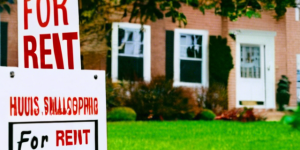
Becoming a First Time Landlord with Rental Property
Many people dream of owning investment properties and becoming landlords. And why not? Building rental income streams promises financial freedom. Yet, for first-timers, managing tenants and properties is often trickier than envisioned. Successfully jumping into land lording requires forethought, research, and preparation.
Your journey transitioning from homeowner to amateur landlord has just begun. Don’t worry, though—follow this guide to navigate key decisions with confidence as you wade into property management. Soon, you will comfortably reap rental rewards.
Clarifying Your Investment Goals
Before anything else, carefully consider why you want to buy rental real estate. Clearly defining goals and motivations will profoundly shape subsequent decisions, unit selection, financing options, and management approach.
For example, seek primarily passive income streams? Crave long-term equity accumulation? Want flexible retirement cash flow? Each objective suggests different ideal investments and landlording strategies. Once you clarify aims, identifying compatible properties becomes easier.
Choosing Where to Buy Rental Property
With goals set, now ponder location. Real estate markets vary tremendously, so study options matching aspirations.
Local or Out-of-State?
First decide whether to buy rentals locally or remotely. Both provide benefits.
Benefits of Local Investment Properties

Becoming a First Time Landlord with Rental Property
Owning nearby rentals simplifies hands-on landlording, allowing you to directly and quickly handle tenant issues, maintenance, unit upgrades, showings, etc. If looking to develop deep community ties through properties, local investing also eases relationship building.
Benefits of Out-of-State Investment Properties
Alternatively, purchasing remotely diversifies holdings across markets. You can capitalize on more favorable purchase costs, rents, taxes, and appreciation rates unavailable locally. Just ensure to vet property managers thoroughly if overseeing from afar.
Other Location Considerations
Also compare specific metro areas and neighborhoods on factors like:
- Rental demand – Seek lots of renter interest ensuring consistent occupancy
- Cash flow potential – Target markets offering optimal rent to price ratios
- Property value outlook – Choose reasonably priced areas poised for appreciation
- Infrastructure and amenities – Favor walkable communities near attractions
- Crime rates – Ensure neighborhood safety
- School district rankings – Top-rated districts command premium rents
- Local employer landscape – Growing major businesses bodes well for rental appeal
- Renovation costs – Lower upgrade expenses improve investment feasibility
Carefully weighing all location pros and cons will guide you towards prudent purchases.
Selecting the Right Rental Property Type
Beyond geography, also decide what kind of rental unit best aligns with your goals. Common first investments include single-family homes, condos/townhomes, duplexes, triplexes, or fourplex residences.
Key Differences Impacting Choices
Consider key variations across property types regarding:
- Affordability – Smaller multi-family buildings often cost less
- Earned rental income – More units equal more total rent
- Cash flow – Single-family rentals initially cash flow better
- Financing options – Lenders treat property types differently
- Maintenance costs – Individual houses typically cost more to upkeep
- Management workload – Multi-unit buildings take more oversight
- Tenant relationships – Interactions range from personal to businesslike
- Liquidity – Individual homes sell fastest typically
Carefully weighing tradeoffs will guide your investing plans.
Finding Good Rental Property Listings
Once clear on goals and target location/property types, the exciting search for potential listings begins. But where to look?
Working With Real Estate Agents
Seeking agent-listed properties makes sense for first-timers. Experienced realtors conveniently aggregate available homes meeting your criteria across area MLS databases. Agents also coordinate showings, negotiate offers, and handle contracts.
Tips for Finding a Good Real Estate Investment Agent
When selecting an agent, find specialists with deep investment property expertise regarding:
- Local markets – Seek market-specific insights on trends, rents, regulations, etc. Local veterans outperform remote mega-agents.
- Property valuations – Confirm extensive comp analysis skills accurately assessing fat profits
- Financing – Ask about landlord loans and secured financing like DSCR products
- Screening tenants – Ensure they understand tenant vetting best practices
- Landlording laws – Require legal insights regarding landlord-tenant relations
- Trustworthiness – Find earnest professionals committed fully to your success
Taking time to identify compatible, strategically-aligned agents with rental expertise pays dividends.
Researching FSBO Listings
In addition to agent listings, also consider for-sale-by-owner (FSBO) properties. FSBOs often sell below market value since owners avoid realtor commissions.
- Scour Craigslist, Zillow, social media groups, and physical yard signs for FSBOs.
- Vet these direct-from-seller deals especially carefully, using comparable sales data and professional inspections to confirm prices and condition.
- Be prepared to handle purchase paperwork and negotiations yourself without an agent’s guidance.
In the right circumstances, FSBOs make fantastic rental investments, enabling bargain buying.
Arranging Financing to Purchase Investment Property
With target properties identified, securing capital funding comes next. Fortunately, multiple landlord-friendly financing options exist beyond conventional mortgages.
Down Payments
Unlike primary home loans, rental property down payments may be as low as 5-15%. Government backed FHA loans require just 3.5% down. This enables first-time investors to enter markets with less cash.
Loan Types
Investor loans differ from standard home loans, coming in two main flavors:
Rental Mortgages
Whether FHA, VA, USDA or conventional loans, rental mortgages work much like primary residence loans. However, you must be qualified based on your existing income and debts. Rental income doesn’t directly impact loan qualification.
Commercial Investor Loans
Alternatively, commercial investor mortgages specifically factor rental property cash flow. These ”DSCR” (debt service coverage ratio) loans qualify you based on the property’s projected net income, meaning you can borrow more.
DSCR products also offer perks like lower down payments, 30-year fixed rates, and interest-only options. However, commercial loan qualification involves strict scrutiny of your landlording track record and rental profitability models.
Other Financing Options
Beyond standard mortgages, first-time landlords can also utilize:
- Hard money loans
- Home equity loans or lines of credit
- 401(k) / IRA funds
- Private money loans from investors
- Partnership structures to pool funds
Getting creative with financing alternatives enables more newbies to achieve ownership.
Preparing Rentals Before Listing: Renovations and Upgrades
Once purchasing your property, preparing it for tenants comes next. While move-in ready homes require little work beyond deep cleaning and maintenance, most investments need upgrades tailored to renters.
Cosmetic facelifts refresh drab or outdated finishes, while strategic enhancements maximize functionality. Follow these renovation best practices when prepping rentals:
Focus Efforts Strategically
Prioritize changes delivering maximum rental value boosts given budget constraints. For instance, avoid over-improving luxury kitchens in working-class neighborhoods.
Blend Essential and Aesthetic Upgrades
Curb appeal matters, but don’t overlook major systems, safety, accessibility, storage, and traffic flow. Find the sweet spot balancing dazzle with function.
Employ Durable Finishes
Opt for indestructible surfaces in high-wear areas: metal vs. wood cabinets, luxury vinyl vs. tile flooring, solid surface vs. laminate countertops. This saves future headaches.
Consider Universal Design Elements
Incorporate ADA-inspired features like zero-entry showers, lever handles, wide halls, low thresholds, and rocker light switches suiting guests of all abilities.
Check Local Property Condition Requirements
Research mandatory habitability rules, lead laws, fire codes, and required efficiencies governing legally rentable homes in your area before investing in renovations.
Attracting Great Tenants and Marketing Vacancies
With welcoming rentals ready to lease, filling vacancies with reliable long-term residents is the next crucial step. Consistent occupancy ensures smooth sailing for novice landlords. But enticing ideal tenants requires strategic marketing and vetting.
Creating Listings
First, craft compelling listings showcasing your property’s amenities and value. Trained agents can provide time-tested rental content templates to adapt. Be sure to splurge on professional photography.
Pricing Units Strategically
When establishing asking rents, research comparative units in the neighborhood, while factoring in property conditions, sizes, amenities, and target tenant profile. Price competitively to attract interest while optimizing ongoing cash flow. Consider offering discounted introductory rates to fill vacancies faster.
Listing Rentals Broadly
Post listings widely across platforms popular with local renters like Zillow, Apartments.com, and Craigslist. Use eye-catching descriptions highlighting amenities most important to tenants.
Promoting Vacancies Strategically
Boost online listings via targeted social media advertising. Geofence ads to surrounding neighborhoods. Leverage remarketing tools keeping your brand top-of-mind among prospective renters browsing listings in the area.
Preparing for Showings
Make an amazing first impression by keeping interiors spotless and staging key rooms. Ensure sufficient availability to give walkthroughs. Provide printed materials like FAQs, applications, leases, and showing feedback forms.
Vetting Tenants Carefully
Showings complete, thoroughly vet applicants before signing leases to avoid delinquent and destructive residents.
Required Renter Screening Protocol
Follow best practice screening involving:
- Background/credit checks assessing financial responsibility
- Employment and income verification ensuring adequate earnings
- Past landlord reference and rental history confirms responsible tenancy
- Full legal identification of all adult occupants
Digging Into Specifics
Probe screening results for potential issues regarding:
- Evictions and property damage history
- Bankruptcies or excessive debts relative to income
- Short job stints or employment gaps
- Large pet ownership, smoking, or other policy violations
- Criminal records involving violence, theft, or fraud
Weigh findings individually given unique contexts when making final tenant selections.
Signing Leases and Move-In Logistics
Upon final tenant approval comes lease execution and move-in coordination.
Ensuring Properly Structured Leases
Utilize binding lease agreements detailing party rights/responsibilities, rent rates/due dates, security deposits, maintenance designations, occupancy limits and all policies protecting you legally as landlord. Define breach protocols addressing issues from late payments to unauthorized guests. State specific tenant financial liabilities for damage repair.
Performing Rental Walkthroughs
Accompany new tenants do document pre-existing unit condition with photos/video on initial move-in. Log any prior wear like carpet stains or appliance dings. Review maintenance protocols and emergency contact procedures. Collect keys distributed.
Collecting Security Deposits
Gather standard first month rent plus full refundable security deposit upfront at lease signing. Typically equal to one month’s rent, security funds cover any unpaid dues or unit damages if tenants vacate improperly. Always provide proper payment receipts.
With ideal residents secured and moved in properly, the fun really starts as new landlord lifestyle commences!
Developing Systems for Ongoing Property Management
Congratulations, your investment property is officially rented! Now the day-to-day work maintaining properties while profiting begins. Be sure to:
Institute Regular Inspections
Perform periodic unit walkthroughs to validate responsible tenant care and identify emerging maintenance needs. Provide proper legally required entry notice beforehand. Incorporate annual/biennial inspections checking safety equipment and essential systems functionality.
Define Maintenance Protocols
Create systems governing how occupants should report issues and how you will coordinate both emergency and routine repairs using trusted providers. Be ultra-responsive to urgent fixes impacting tenant health or property integrity.
Cultivate Relationships
Make regular contact with friendly check-ins to monitor experience and changing needs. When possible, provide little conveniences like replacing furnace filters proactively or touching up scuffs for free. Such gestures foster community.
Implement Rent Payment Systems
Establish clear on-time monthly rent collection processes via direct bank transfers. Avoid cash payments. Quickly address non-payment according to lease policies. Annually adjust rents according market rates.
Maintain Detailed Records
Closely document all financial transactions, communications and unit activity for taxes and dispute mediation if ever necessary.
While arduous at times, honing such operational processes improves landlording efficiency greatly.
Evaluating Direct vs Outsourced Property Management
Especially when juggling multiple properties, consider whether to self-manage units or utilize a third-party rental property management service. Assess options.
Handling Everything Yourself
Self-managing maximizes rental revenue since no middleman fees deduct. Hands-on control enables establishing genuine tenant relationships through service. Execute upgrades and renovations per your exact specifications.
However, doing everything personally demands major time investments directly handling maintenance, advertising vacancies, screening applicants, chasing late rent, evictions, accounting, etc. Potentially risky unless extremely organized.
Hiring an Onsite Manager
For larger properties like multi-family buildings, onsite manager hires who live rent-free in exchange for handling operations are common. This delegates reliably to someone always available when tenant issues inevitably arise. Just split additional units to cover their compensation. Potential personality conflicts do loom though with live-in arrangements.
Using Third-Party Property Management Firms
Alternatively, experienced full-service property management companies oversee everything for around 10% of collected rents. They market listings, vet tenant applications, coordinate maintenance, direct lease renewals and more so owners enjoy truly passive income. However such help isn’t free or perfect. Reputations vary greatly across providers.
Weigh cost/benefit tradeoffs regarding your budget, portfolio scale and personal bandwidth when deciding between self-management and outsourcing. Hybrid approaches are also possible.
Preparing to Handle Challenging Tenant Situations
Even the most prudent preparation and strict tenant vetting cannot prevent occasional conflicts. Prepare professional protocols addressing difficult scenarios like:
Late Rent Payments
Have clear lease terms dictating precise late fee assessments after strict payment due dates, and required actions following protracted non-payment from firmly worded notices through to eventual needed evictions.
Unexpected Departures Mid-Lease
While security deposits discourage premature move-outs, be ready to aggressively remarket and fill vacancies should they occur unexpectedly. Also account for all funds owed through lease conclusion during final walkthroughs.
Unauthorized Occupants or Pets
Protect profitability and peace by quickly addressing unauthorized residents or pets discovered during inspections. Kindly refer to signed leasing contracts when asking offenders to vacate or remove pets. Serve formal notices as needed per local regulations.
Tenant Complaints About Conditions
Address authentic structural or system failures promptly. For suspect claims, conduct joint unit walkthroughs to demonstrate pristine conditions proving accusations false. Offer reasonable concessions to placate complainers.
Property Damage
When damage is reported/observed, investigate cause and coordinate professional repairs, billing validated expenses to tenant security deposits when warranted. In cases of extreme destruction, file insurance claims.
While staying constantly positive, also be prepared to firmly exercise full legal authority. Protect hard earned returns.
Leveraging Expert Guidance
Don’t go it alone! Cultivating trusted mentors accelerates success.
Finding an Accountant
A tax-saavy accountant specialized in landlord clients ensures fully optimized returns. Review filings together and discuss growth strategies for expanded holdings.
Working with Legal Counsel
Establish relations with a real estate attorney to consult regarding localized compliance, landlord-tenant law, lease standards, and liability considerations when issues arise.
Networking with Fellow Landlords
Join regional landlord associations to exchange ideas with veterans owning similar portfolios. Brainstorm solutions and cautionary tales about navigating tricky situations.
Surrounding yourself with skilled specialists ensures you avoid costly missteps when charting new territory.
Conclusion
While rentals offer alluring income streams, seamless landlording requires tireless effort, at least initially. But follow these guides to clarify goals, select properties in promising markets, fund deals advantageously, upgrade units strategically, market rentals effectively and manage operations smoothly. Over time, portfolios provided diversified passive earnings do materialize if you invest diligently. Soon you will enjoy the many rewards of maintaining properties for the benefit of others. Just take that first step—happy renting!
Commonly Asked Questions About Becoming a First Time Landlord
Below are answers to some frequently asked questions about starting out as a new landlord:
What are the main start-up costs for first-time landlords?
Key upfront costs typically include: down payments, closing fees, inspection/appraisal charges, financing costs, renovation & upgrade projects, staging, photography/marketing materials, legal fees, insurance policies, maintenance reserves, etc. Budget substantially to launch properly.
What legal protections exist for novice landlords?
Key legal provisions benefiting landlords include requiring detailed lease agreements outlining tenant responsibilities, collecting security deposits covering damages, adhering to entry notification laws, documenting property condition, following precise eviction protocols, small claims court options, housing discrimination prohibitions, etc. Know rights.
What are tenant red flags to watch for?
Beware applicants with prior evictions, collections/legal judgments against them, credit scores below 600, felony convictions, frequent past moves, incomplete rental histories, missing identification, pet policy violations or who resist standard
]]>
Home Improvement Grants for Elderly and Disabled
Elderly and disabled homeowners face unique challenges when it comes to maintaining and improving their homes. As we age, mobility becomes more difficult and completing routine household tasks like yardwork, cleaning gutters, and making repairs can be physically taxing or even hazardous. Fortunately, many government and nonprofit programs provide grants and funding opportunities specifically aimed at helping senior citizens and people with disabilities make necessary home modifications.
Types of Home Improvements Covered

Home Improvement Grants for Elderly and Disabled
There are grants available to help elderly and disabled homeowners make all kinds of upgrades and changes to their houses. Some of the most common home improvement projects funded include:
Accessibility Modifications
One major category of home improvements involves modifications like:
- Installing wheelchair ramps
- Widening doorways for wheelchair access
- Upgrading to larger showers and bathtubs
- Adding grab bars and handrails
- Improving lighting and floor surfaces
These changes help improve mobility and allow people to more easily and safely perform everyday tasks.
Health and Safety Upgrades
Grants can also help fund updates like:
- Fixing old electrical wiring
- Replacing heating and AC systems
- Improving insulation and weatherproofing
- Installing smoke detectors and alarms
- Eliminating fall hazards like loose carpeting
Such improvements enhance overall wellbeing and security.
Exterior and Structural Repairs
Finally, grants help homeowners afford major projects like:
- Re-siding and roof replacement
- Fixing porous foundations
- Rebuilding crumbling chimneys
- Repaving cracking driveways
- Pruning overgrown trees near the home
These exterior and structural repairs maintain the integrity of the home.
Common Providers of Home Improvement Grants

Home Improvement Grants for Elderly and Disabled
There are a few major sources that provide home improvement grants specially tailored to meet the needs of elderly and disabled residents.
Federal Government Grant Programs
Several federal agencies like the Department of Housing and Urban Development (HUD) and Veterans Affairs offer grants and low-interest loans for accessibility remodels and health-related upgrades. Most programs are income-based and give funding priority to low-income applicants.
State and Local Governments
In addition to federal options, many state housing agencies and city community development departments have special assistance funds for necessary home repairs. These programs help pick up where federal grants leave off and serve more middle-income elderly and disabled homeowners.
Nonprofit Organizations
Finally, various nonprofit groups and charities provide home improvement grants. For example, groups like Rebuilding Together, Habitat for Humanity, and The Home Depot Foundation partner with volunteers to assist elderly, disabled, and veteran homeowners with maintenance and repairs.
Eligibility Requirements for Home Improvement Grants
While specific eligibility rules differ across programs, most home improvement grants for elderly and disabled have a few general requirements:
Home Ownership
Nearly all programs require applicants to own and occupy the home needing repairs. Renters are generally not eligible.
Residency Status
Most grants require recipients to be permanent legal residents within the United States.
Financial Need
Since grants provide free financial assistance, applicants must demonstrate economic hardship and an inability to fund repairs alone. Specific income thresholds apply.
Age and Disability
Grant recipients must be elderly, defined as 60+ years old in most programs, or have a documented disability recognized by the Social Security Administration. Proof of age or disability is typically required.
Property Taxes and Insurance
Applicants also must have up-to-date property taxes and homeowner’s insurance to qualify for most programs. delinquent accounts or lack of insurance may disqualify applicants.
How to Apply for Home Improvement Grants
If you meet eligibility rules, follow these steps to seek home improvement funding:
Identify Needed Repairs
First, make a list of projects, getting contractor quotes for larger repairs. This helps estimate costs and clarify work required.
Research Available Grant Programs
Next, search for grants suited to your needs and eligibility. Catalog grant details like maximum awards, household income limits, and application deadlines.
Gather Required Documentation
You will need to submit items verifying identity, home ownership, age/disability status, income, residency, and insurance coverage. Start compiling needed paperwork.
Complete Applications Thoroughly
Follow all instructions carefully, accurately filling in each section. Supplement with required documents. Submit applications before specified deadlines.
Await Funding Decisions
Finally, grant administrators will contact you regarding award decisions and next steps. Funds may distribute directly to homeowners or contractors once work is approved.
While not guaranteed due to high demand, home improvement grants can make critical home repairs possible for older adults and people with disabilities struggling to manage expenses. With some research and planning, you can access these benefits.
Commonly Asked Questions About Home Improvement Grants for Elderly and Disabled
Below are answers to a few frequently asked questions about home improvement grant programs for elderly and disabled homeowners:
What Repairs Do the Grants Typically Cover?
Common projects funded by grants include wheelchair ramp and grab bar installation, doorway widening, kitchen/bath remodels improving accessibility, electrical and HVAC upgrades, exterior repairs like new roofs or siding, and more.
How Much Money Can I Get From a Home Improvement Grant?
Grant amounts vary greatly by program, from several hundred to tens of thousands of dollars. Budgets depend on factors like income level, repair extent, and funding availability. Many require homeowners to contribute a percentage toward project costs.
Where Does the Grant Money Come From?
Home improvement grants derive from government allocations, non-profit charitable giving, corporate philanthropic efforts, and other public/private partnerships aimed at assisting vulnerable elderly and disabled populations maintain safe, habitable housing.
What Restrictions or Rules Are Placed on How I Spend Grant Money?
Grant programs detail approved uses for awarded funds, typically limiting spending to pre-determined necessary repairs related to health/safety and accessibility. Work must also comply with state and local building codes and zoning laws. Strict oversight governs distribution from grantees to contractors.
How Can I Improve My Chances of Getting Approved for a Home Improvement Grant?
Tips for increasing odds of success include clearly detailing repair needs, getting multiple contractor estimates, gathering all required financial/demographic documentation, calculating precise project costs, demonstrating dire need, and having favorable credit/background checks. Also apply early, as some grants are first come, first served.
Conclusion
Maintaining and improving a home becomes increasingly difficult with age and disability. Fortunately home improvement grants ease the financial burden for vulnerable populations struggling with mobility limitations and fixed incomes. Multiple government, nonprofit and community assistance programs provide aid, prioritizing necessary repairs that allow elderly and disabled homeowners to preserve independence and remain living safely in their houses as long as possible.
If you or a loved one need help funding critical home modifications, research available grants, evaluate eligibility, and complete comprehensive applications. With persistence and planning, vital assistance is within reach, helping ensure your needs are met
]]>
Home Buying Assistance Programs for Veterans
Purchasing a home is a major financial commitment that can be challenging, especially for veterans on fixed incomes or with disabilities. Fortunately, there are various home buying assistance programs tailored specifically to service members, veterans, and their families. These programs make homeownership more accessible and affordable.
VA Loans
One of the most popular VA home loans is the VA-backed loan, which allows eligible veterans and service members to finance 100% of the home purchase price without requiring a down payment. According to the U.S. Department of Veterans Affairs (VA), VA loans offer competitive interest rates and flexible underwriting guidelines.
To qualify for a VA loan, the borrower must have served at least 90 days of active duty during wartime, or 181 days during peacetime, and received an honorable or general under honorable conditions discharge. Unmarried surviving spouses of veterans who died in service or from service-connected disabilities may also be eligible.
Native American Direct Loan Program
The Native American Direct Loan (NADL) program allows eligible Native American veterans to purchase, construct, or improve a home on federal trust land with no down payment required. This program is administered through the Department of Veterans Affairs.
To qualify for the NADL program, applicants must be an eligible Native American veteran, pay a funding fee, have sufficient income to meet repayment requirements, and agree to personally occupy the property as their primary residence. The loan can be used on or near federal trust lands in designated tribal areas.
The VA Grant
The VA Specially Adapted Housing (SAH) grant provides veterans with certain service-connected disabilities up to $90,364 (as of 2023) to help build, remodel, or purchase an adapted home to accommodate their disability.
To qualify for the SAH grant, veterans must have a VA disability rating for a permanent and total service-connected disability due to: loss or loss of use of both lower extremities; blindness in both eyes plus loss or loss of use of one lower extremity; loss or loss of use of one lower extremity with residuals of organic disease or injury; loss or loss of use of one upper extremity; or severe burn injuries.
State and Local Assistance Programs
Many states and local jurisdictions offer home buyer assistance programs for veterans and surviving spouses tailored to their areas. These can include down payment and closing costs assistance, reduced interest mortgage programs, property tax exemptions, and more.
For example, Texas offers the Texas Veterans Home Loan Program which provides below-market interest rate loans to eligible veterans for the purchase of homes within the state. Applicants must meet requirements related to Texas residency, qualifying military service, income thresholds and homebuyer education.
It’s important for homebuyers to research what veteran home loan benefits may be available in their state and municipality to maximize affordability.
VA Mortgage Life Insurance
Veterans with severe service-connected disabilities approved for Specially Adapted Housing (SAH) assistance can receive mortgage life insurance through the VA mortgage protection program under 38 U.S. Code § 2106.
This program provides up to $200k of mortgage life insurance payable directly to the mortgage lender in the event of the veteran’s death. Benefits are limited to veterans rated for SAH assistance so their surviving family members don’t lose the home. It covers the home’s mortgage balance in case of unexpected tragedy soon after buying the adapted property.
Interest Rate Reduction Refinancing Loan (IRRRL)
A VA Interest Rate Reduction Refinancing Loan (IRRRL) allows eligible veterans and service members to refinance an existing VA-backed loan to reduce their interest rate and lower their monthly payment.
Veterans can use an IRRRL to refinance any existing VA mortgage, regardless of loan age, without requiring an appraisal or credit underwriting. This provides veterans an affordable option to refinance into lower rates without the costs and hassles lenders often impose. It helps veterans responsibly manage housing costs over their lifetime.
VA Renovation Loans
The VA renovation loan allows qualified veterans and service members to purchase a home and finance additional renovation costs into one VA-guaranteed loan at a competitive fixed interest rate.
Up to $6k in energy efficiency improvements can be added without requiring an appraisal of the changes. And veterans aren’t required to have cash on hand or take out a second loan to pay for home improvements separately. This makes it more feasible for veterans to modernize, upgrade, or adapt a home to suit their needs.
Housing Grants for Disabled Veterans
The VA Special Housing Adaptation (SHA) grant provides up to $20,config test 487 (2023 amount) to help veterans with certain service-connected disabilities adapt or purchase housing to accommodate their disability.
To be eligible for SHA grants, veterans and servicemembers must have VA disability ratings for blindness in both eyes with 5/200 visual acuity or less, anatomical loss or loss of use of both hands, severe burns, or certain respiratory injuries and illnesses. SHA funds can be used to adapt homes by installing wheelchair ramps, widening doors, lowering cabinets, and more based on need.
VA Guaranteed Loans
VA home loans from private lenders are backed by the VA, allowing veterans and military members to receive favorable loan terms without requiring a down payment in most cases. Qualified borrowers can still receive low interest rates on a VA guaranteed loan even if they don’t meet all criteria that standard conventional loans require.
Because the VA guarantees a portion, lenders view these loans as low-risk. This allows veterans who may not qualify through regular lending programs to still finance home purchases with a VA home loan backed by the stability and resources of the federal government.
State Veterans Homes
Many states offer veteran homes and long-term care facilities for former servicemembers in need of assisted living support. While not focused specifically on home buying per se, these facilities provide affordable housing, skilled care, and other benefits exclusively to qualifying veterans which enhances health-related quality of life.
Eligibility differs between states but often prioritizes veterans who served during specific periods of conflict or became disabled due to their military service. Additionally, states usually require applicants to satisfy state residency and income requirements. But costs are generally subsidized substantially for qualifying veterans compared to private sector assisted living.
Homeless Veteran Housing and Services
Various programs provide housing, rehabilitation, and support services for eligible homeless veterans through the Department of Housing and Urban Development (HUD) and VA.
- The HUD-VASH program partners with Public Housing Authorities to offer rental assistance vouchers and VA case management services to help homeless veterans secure long-term housing.
- SSVF grantees provide transitional housing resources and support to rapidly rehouse homeless veteran families.
- The VA also offers healthcare, rehabilitation, employment assistance and connection to permanent housing options for homeless veterans.
While not focused explicitly on homebuying itself, these homeless veteran services aim to progress qualifying individuals through steps necessary to ultimately attain the financial means, stability, sobriety, and health required for eventual independent homeownership.
Habitat for Humanity
Some Habitat for Humanity local programs occasionally prioritize veterans for assistance building or renovating affordable housing through volunteer community efforts.
While opportunities vary by location and availability, eligible veterans who lack adequate shelter may qualify for constructing or rehabilitating durable, energy-efficient Habitat homes funded by public grants and private donations. Selected
veterans partner with Habitat for Humanity families, volunteers, and sponsors to cover construction costs with affordable mortgage payments capped at 30% of their income. This model helps veteran families in need achieve homeownership through reasonable loans they can sustain long-term without overburdening their finances.
Though organized irregularly based on local resources, Habitat’s model offers a proven path for some veterans to purchase affordable housing through reasonable loans toward independent home ownership. Veterans interested in potential Habitat partnership opportunities should contact their local chapter to inquire about projects, eligibility and application requirements.
Home Loans for Surviving Spouses
VA home loans extend favorable terms not only to veterans themselves but qualifying spouses after veterans’ passing. An un-remarried surviving spouse of a veteran missing in action or killed in the line of duty retains home loan eligibility.
Additionally, surviving spouses of veterans who died from service-connected disabilities qualify for VA home loans subject to occupancy rules and duration limits. This housing loan benefit honors veterans’ service by facilitating financial security for widowed spouses transitioning to sole household head roles after losing partners to conflict or disabling injury.
Offering VA loans to eligible survivors provides lasting support to military families dealing with grief of profound loss. Extending these home financing options aids stability when reassembling lives split apart by a loved one’s ultimate sacrifice defending the nation. It punctuates that the veteran’s commitment and devotion to country live on by caring for their surviving family members’ wellbeing.
Conclusion
The Department of Veterans Affairs (VA) offers diverse home loan programs, grants, and other housing assistance opportunities tailored for disabled veterans, low-income veterans, and surviving spouses spanning loan terms, interest rates, down payments, adaptations for disability needs, and other options. Veterans denied access to traditional financing channels can turn to VA home loan guarantees approving their borrowing eligibility when private banks demur. Various federal, state, local, nonprofit, and charitable initiatives strive through incremental innovations to put home ownership or sustainable adaptable shelter within closer grasp for more veterans and their families. cada año.
While navigating these home buying resources still requires proactive effort, veterans willing to explore and identify options offering the best fit can gain surer footholds upholding household stability, financial security, and brighter prospects advancing their life trajectories.
Frequently Asked Questions
Q: What is a VA mortgage fund fee?
A: The VA mortgage funding fee is an upfront fee charged by the VA to borrowers obtaining a VA home loan. It is a percentage of the loan amount borrowed and can be financed into the loan. Exempted groups include veterans receiving VA disability compensation and Purple Heart recipients.
Q: Can I use a VA-backed loan multiple times?
A: Yes, veterans can utilize a VA-backed mortgage more than once when purchasing homes, moving, refinancing, or upgrading from a previous VA loan. VA loans can be reused multiple times with no lifetime limit.
Q: What happens if I become delinquent on VA home loan payments?
A: If your payments become 60 days past due, the VA contacts you and provides information about assistance to help bring the loan current. If unable to make payments, the VA provides loan technician support to explore options before the loan goes to foreclosure.
Q: Can I rent out my home after purchasing with a VA home loan?
A: Most VA loans require veterans to occupy the home as their primary residence. However, some VA loans permit renting out the property if you must relocate for military service, employment, health conditions, or certain other reasons on a temporary basis if approved.
Q: How can I apply for VA home buying assistance programs and grants?
A: Veterans can apply for VA home loans and many grants directly through their VA regional loan center. For other federal and state veteran home programs, applicants must follow each organization’s application instructions individually when seeking assistance options.
]]>Grants for Single Moms to Buy a House

Grants for Single Moms to Buy a House
Buying a house is a significant milestone, especially for single mothers who are striving to provide a stable home for their children. However, it can also be a daunting task due to the high costs involved. Fortunately, there are several grants available to assist single mothers in achieving their dream of owning a home. Here are some of the grants that can help single mothers purchase a house.
1. American Legion Family Emergency Grants
The American Legion offers three grants to help emergency funding for single mothers and its members who experience natural disasters and other financial emergencies. These grants include:
- American Legion National Emergency Fund (NEF) Grant: Helps active members of the American Legion and Sons of the American Legion. Grant awards up to $3,000 are available to address immediate needs in the wake of a natural disaster 1.
- American Legion Auxiliary Emergency Fund (AEF) Grant: Offers up to $2,400 of financial help to active members of the AEF who can’t pay rent or utilities, are navigating a natural disaster, or have other dire money needs 1.
- American Legion Temporary Financial Assistance (TFA) Grant: Up to $1,500 of cash assistance available for active American Legion members or active duty service members who are raising children 17 or younger (20 if still in high school or with a disability). Funds are for housing costs, food, and health expenses 1.
2. CORE Grant
The Children of Restaurant Employees (CORE) organization provides financial assistance grants to help families pay rent or a mortgage, get much-needed medical supplies, buy food, pay for childcare, and more. This assistance is only for short-term help. You must be a food and beverage service employee with children to be considered for a grant. Grant award amounts are determined case-by-case 1.
3. Union Plus Grants
Are you a member of a union? You may be eligible for a grant from Union Plus, a nonprofit created by the American Federation of Labor and Congress of Industrial Organizations (AFL-CIO). To be eligible, you must be experiencing a hardship and have one of the following: Union Plus mortgage, Union Plus credit card, Union Plus personal loan, Union Plus supplemental insurance. These grants cover everything from benefits to pay essential bills to financial help to keep your home 1.
4. Community-based Grants
Check your area for community-based grants aimed at helping low-income families or people facing an immediate hardship. Some programs include:
- Family Crisis Fund: Offers a one-time grant of up to $2,500 to help Richmond residents pay bills, rent, or cover a down payment for a new home 1.
- Crisis Assistance Ministry: Offers rent and utility bill assistance to help residents in Mecklenburg County, N.C., who are experiencing financial difficulty 1.
- Memorial Assistance Ministry: In Harris County, Tx., offers a one-time payment of $1,500 for eligible residents to help pay for emergency expenses 1.
5. State and Local Grants
Various state and local governments offer grant programs designed to encourage homeownership among specific populations, including single moms and low-income individuals. For instance, the “California Homebuyer’s Downpayment Assistance Program” offers a deferred-payment junior loan to help eligible families with the down payment or closing costs 2.
6. Down Payment Assistance Programs
Down payment assistance programs can help single mothers clear their down payment hurdle. With over 2,000 DPA programs nationwide, home buyers in every state can find a local program they may qualify for. For example, Pinellas County, Florida, First-time Homebuyer Program helps with down payment and closing costs assistance with a $7,500, zero percent interest loan that is deferred until you sell, refinance, or payoff the home 3.
7. Government Grants for Single Mothers
While the government doesn’t offer grants to individuals to help with buying food or to pay for housing expenses, it does offer benefit programs through Benefits.gov like Temporary Assistance for Needy Families (TANF) and the Supplemental Nutrition Assistance Program (SN
AP) for assistance with food, nutrition, and healthcare 1.
8. Educational Grants for Single Mothers
Educational grants are often the most commonly available grants for single mothers. These grants usually come based on financial need. The Pell Grant is the basic grant available to low-income individuals. The Federal Supplemental Education Opportunity Grant is available for those with exceptionally low income. There are other grants available for those that combine financial need with academic achievement. Those include the National SMART Grant and the Academic Competitiveness Grant. These grants are available to anyone with the financial qualifications 1.
9. Hardship Grants for Single Mothers
Hardship grants offer money to address dire needs and emergency situations. The money often comes quickly to those in need and does not require repayment. These grants can be particularly useful for single mothers who are facing immediate financial hardships 2.
10. Community-based Grants
Check your area for community-based grants aimed at helping low-income families or people facing an immediate hardship. Some programs include:
- Family Crisis Fund: Offers a one-time grant of up to $2,500 to help Richmond residents pay bills, rent, or cover a down payment for a new home 2.
- Crisis Assistance Ministry: Offers rent and utility bill assistance to help residents in Mecklenburg County, N.C., who are experiencing financial difficulty 2.
- Memorial Assistance Ministry: In Harris County, Tx., offers a one-time payment of $1,500 for eligible residents to help pay for emergency expenses 2.
11. State and Local Grants
Various state and local governments offer grant programs designed to encourage homeownership among specific populations, including single moms and low-income individuals. For instance, the “California Homebuyer’s Downpayment Assistance Program” offers a deferred-payment junior loan to help eligible families with the down payment or closing costs 3.
12. Down Payment Assistance Programs
Down payment assistance programs can help single mothers clear their down payment hurdle. With over 2,000 DPA programs nationwide, home buyers in every state can find a local program they may qualify for. For example, Pinellas County, Florida, First-time Homebuyer Program helps with down payment and closing costs assistance with a $7,500, zero percent interest loan that is deferred until you sell, refinance, or payoff the home 3.
13. Government Grants for Single Mothers
While the government doesn’t offer grants to individuals to help with buying food or to pay for housing expenses, it does offer benefit programs through Benefits.gov like Temporary Assistance for Needy Families (TANF) and the Supplemental Nutrition Assistance Program (SNAP). Learn more about EBT cash benefits, EBT discounts and freebies, and how to use your EBT card on Amazon 2.
14. Grantspace.org
This site has a comprehensive list of grants for individuals, artists, small businesses, and nonprofits — including hardship grants for single moms 2.
15. Community Development Block Grant
The Community Development Block Grant (CDBG) is a federal program that gives states and local governments the flexibility to develop and implement programs that address the social and economic needs of their communities. This could include programs to help single mothers purchase a home 2.
Conclusion

Grants for Single Moms to Buy a House
Buying a house can be a challenging endeavor, especially for single mothers who are trying to secure a stable home for their children. Thankfully, there are numerous grants and programs available that can assist single mothers in realizing their dream of homeownership. Whether it’s through educational grants, hardship grants, community-based grants, state and local grants, down payment assistance programs, or government grants, there are plenty of resources available to help single mothers achieve their goal. Remember, the key to success in securing a
home is understanding what’s out there and knowing how to navigate the process. Don’t hesitate to reach out to local organizations, community centers, and government offices for assistance. They can provide valuable guidance and help you understand which grants and programs you might qualify for.
Frequently Asked Questions
1. What is the first step in applying for these grants?
The first step is to identify which grants you are eligible for. This will depend on your individual circumstances, such as your income level, family size, and location. Once you’ve identified potential grants, you can begin the application process.
2. Are there any fees associated with applying for these grants?
Most grants are free to apply for, but there may be fees associated with processing the grant once it’s awarded. Be sure to check the specific requirements and guidelines for each grant.
3. How long does it take to receive a grant after application?
The time it takes to receive a grant can vary greatly depending on the specific grant and your individual circumstances. Some grants may be processed quickly, while others may take longer. It’s best to check the timeline for each grant you’re interested in.
4. Can I apply for multiple grants at once?
Yes, you can apply for multiple grants at once. However, be aware that each grant has its own eligibility criteria and application process. Make sure to carefully review each grant’s requirements before applying.
5. What happens if I don’t meet the eligibility requirements for a grant?
If you don’t meet the eligibility requirements for a grant, you won’t be able to apply for it. However, there are many other grants available that may suit your needs better. Take the time to research and find the grants that are most relevant to your situation.
Buying a House with Low Income: A Comprehensive Guide
Introduction

Buying a House with Low Income
Buying a house is a significant financial commitment, and for many people, it’s a daunting task. However, with the right strategies and resources, it’s possible to achieve this dream even on a limited income. This guide will provide you with practical tips and insights to help you navigate the home buying process effectively.
Understanding the Home Buying Process
Before diving into the specifics, let’s first understand the home buying process. It typically involves several steps:
- Setting a Budget: Determine how much you can afford to spend monthly on housing. This includes not only your mortgage payment but also utilities, maintenance costs, and taxes.
- Researching Properties: Look for properties that fit within your budget and meet your needs. Check out different neighborhoods and types of homes.
- Working with a Realtor: A realtor can help you navigate the complexities of the housing market, negotiate deals, and close transactions.
- Securing Financing: This could involve saving for a down payment, obtaining a mortgage loan, or exploring other financing options.
- Home Inspection: Before closing, have a professional inspect the property to identify any potential issues.
- Closing the Deal: Once you’ve agreed on a price, your realtor will handle the paperwork and coordinate the transfer of funds.
Maximizing Your Savings
When buying a house with low income, maximizing your savings is crucial. Here are some strategies to help you save:
1. Downpayment Assistance Programs
Many states and cities offer downpayment assistance programs that can provide financial assistance to eligible homebuyers. These programs can cover a portion of your downpayment, making it easier to secure a mortgage.
2. Flexible Mortgage Options
Consider flexible mortgage options like adjustable-rate mortgages (ARMs) or government-insured loans. These can provide lower initial rates and potentially lower monthly payments.
3. DIY Repairs
Doing some repairs yourself can save you money. However, make sure you’re qualified to do the work to avoid further damage or costly repairs later.
Choosing the Right Property

Buying a House with Low Income
Selecting the right property is key to achieving your home buying goals. Here are some factors to consider:
1. Location
Your location is one of the biggest factors in determining the value of your home. Choose a neighborhood that is safe, has good schools, and offers amenities that suit your lifestyle.
2. Property Condition
The condition of the property is crucial. Look for a home that requires minimal repairs and has been maintained well.
3. Homeowner Association Fees
Some neighborhoods have homeowner associations (HOAs) that require regular fees. Make sure to factor these costs into your budget.
Navigating the Mortgage Process
Obtaining a mortgage can be challenging, especially with low income. Here are some tips to simplify the process:
1. Understand the Loan Terms
Before signing any loan documents, make sure you understand the terms. This includes the interest rate, loan term, and any fees associated with the loan.
2. Shop Around for Rates
Compare rates from different lenders. Some lenders may offer lower rates or better terms, especially for borrowers with lower credit scores.
3. Consider Non-Traditional Lenders
Non-traditional lenders like online lenders or credit unions may offer more flexible terms or lower rates than traditional banks.
Utilizing Online Resources
In today’s digital age, there are numerous online resources available to assist you in the home buying process. Here are some to consider:
1. Online Marketplaces
Websites like Zillow or Redfin allow you to browse properties, schedule viewings, and negotiate deals.
2. Financial Calculators
Online calculators can help you determine how much house you can afford based on your income, debts, and downpayment.
3. Homeowner Guides
Guides and articles on websites like HomeAdvisor provide useful tips and information on various aspects of home ownership.
Conclusion
Buying a house with low income may seem daunting, but with careful planning, savvy shopping, and the right resources, it’s achievable. Remember, every journey starts with a single step. Take it one day at a time, and soon enough, you’ll be stepping onto the path towards homeownership.
FAQs
1. How do I determine my budget for a house?
- Start by calculating your monthly expenses and then allocate a certain percentage of your income for housing. The typical rule of thumb is to not exceed 28-36% of your gross income on housing.
2. What should I look for in a Realtor?
- Experience, reputation, knowledge of the local market, communication skills, and availability are all important factors.
3. What are some good downpayment assistance programs?
- Many states offer programs like First Time Homebuyer Tax Credit, Homebuyer Assistance Programs, and Veterans Affairs Home Loans.
4. How can I find a good mortgage lender?
- Compare rates and terms from different lenders, consider your credit score, and look for lenders with good customer service.
5. Where can I find affordable homes?
- Consider looking affordable areas. Consider looking at areas with lower property values or considering foreclosed properties.

First Time Home Buyer Programs by state
Buying your first home is an exciting milestone in life. It represents independence, stability and a chance to put down roots in a community you love. But the process of purchasing real estate for the first time can also be daunting, especially when it comes to securing financing. That’s where first time home buyer programs can help!
What are First Time Home Buyer Programs?
First time home buyer (FTHB) programs are special programs offered by federal, state and local governments, as well as private lenders, to help make buying a home more affordable for qualifying first time purchasers. These programs offer various types of assistance, such as:
- Down payment assistance – Programs that provide grants, forgivable loans or matching funds to help with your down payment and closing costs. This allows you to buy a home with less money out of pocket.
- Reduced interest rates – State and local housing agencies partner with lenders to offer below-market interest rates on home loans for first time buyers. This results in lower monthly mortgage payments.
- Tax credits – Some programs provide federal income tax credits up to $2,000 – $8,000 to help offset the cost of buying your first home. Credits are applied when you file your tax return.
- Reduced PMI – Private mortgage insurance (PMI) is typically required when you put less than 20% down. Some programs help first time buyers reduce or eliminate PMI.
- Decreased insurance premiums – Certain state and local programs help first time home buyers receive discounts on homeowners insurance rates.
- Homebuyer education – Many programs require completing a homebuyer education course. This helps equip you with skills for sustainable homeownership. Some programs then provide a certificate which qualifies you for grants or other perks.
The great news is that every state offers first time home buyer assistance programs to residents! The specifics vary widely, but taking advantage of these opportunities can make financing your first home much more feasible.
Below we will explore FTHB programs available in each state and how to determine if you qualify.
Alabama First Time Home Buyer Programs
The Alabama Housing Finance Authority offers two key programs to support first time buyers in the state:
Step Up Alabama Down Payment Assistance
This statewide program provides a 30 year, fixed rate mortgage along with down payment and closing cost assistance. Qualified borrowers receive a 5% grant based on the loan amount. For example, if you purchase a $100,000 home, you would get $5,000 in down payment help.
To qualify, home buyers must:
- Be first time buyers who have not owned a home in the past 3 years
- Meet income limits by county and household size
- Occupy the home as your full-time primary residence
- Have a credit score of at least 640
- Complete a pre-purchase homebuyer education course
Mortgage Credit Certificate (MCC)
Alabama’s MCC provides an annual federal income tax credit up to $2,000 on your mortgage interest. The credit essentially reduces your tax bill, so your refund is larger. MCC credits can be claimed each year you occupy the home.
To qualify, home buyers must:
- Be first time buyers who have not owned a home in the past 3 years
- Purchase a home within certain price limits
- Occupy the home as your full-time primary residence
- Meet income limits by county and household size
Combining Step Up with MCC is a great way for first timers to maximize affordability in Alabama. Speak with a lender and request more information on qualification requirements for these programs in your area.
Alaska First Time Home Buyer Programs
The Alaska Housing Finance Corporation (AHFC) provides the following assistance for eligible first time buyers:
AHFC HomeChoice Down Payment Assistance
The HomeChoice program offers a 30 year fixed rate mortgage along with a grant equal to 4% of the loan amount to help with down payment and closing costs. For a $200,000 home purchase, you would receive an $8,000 grant.
To qualify for HomeChoice assistance, buyers must:
- Be first time buyers who have not owned a home in the past 3 years
- Meet income and home price limits
- Occupy the home as your full-time primary residence
- Have a minimum credit score of 640
- Contribute at least $1,000 of your own funds
Senior Citizens Housing Development Fund (SCHDF)
SCHDF provides additional grants to help buyers age 55 and over purchase a home. Senior buyers can receive up to $10,000 in down payment assistance and closing costs.
Homebuyer Education
AHFC requires all home buyers using its programs complete an approved homebuyer education course prior to closing. This helps prepare Alaska buyers for informed, sustainable homeownership.
Get in touch with an AHFC loan officer today to find out more about utilizing these programs for your first home purchase.
Arizona First Time Home Buyer Programs
The Arizona Housing Finance Authority offers down payment and closing cost help through two key initiatives:
Homes for Arizonans Homebuyer Assistance
This program offers 30 year fixed rate mortgages paired with 3% or 4% grants for down payments and closing costs. For a $150,000 home, a 3% grant would equal $4,500 in assistance.
To qualify, buyers must:
- Be first time home buyers
- Meet income limits by county
- Have a minimum credit score of 640
- Contribute at least $1,000 of their own funds
MCC Advantage
MCC Advantage provides qualified first time buyers with a federal income tax credit. You can claim up to $2,000 in credits each year you occupy the home. MCC Advantage works in conjunction with Homes for Arizonans, allowing buyers to combine down payment help and ongoing tax savings.
In addition to state programs, individual counties and cities in Arizona may offer local first time buyer assistance. Reach out to lenders to ask about what combination of state and local programs you may be eligible for.
Arkansas First Time Home Buyer Programs
Two great options are available to first timers in Arkansas:
Arkansas Dream Down Payment Initiative
This statewide program offers 30 year fixed rate mortgages combined with either 3% or 4% down payment and closing cost assistance in the form of a forgivable second lien. Borrowers must qualify based on income limits and occupy the home as their primary residence.
MCC Partnership
The MCC provides qualifying buyers with an annual federal tax credit up to $2,000 based on mortgage interest paid. Participants get to claim the credit each year they live in the home. MCC can be combined with the Dream program for added savings.
Ask your lender for details on eligibility and how to apply for these Arkansas programs when purchasing your first home.
California First Time Home Buyer Programs
California offers several initiatives to help first time purchasers:
CalHFA Mortgage Credit Certificate (MCC) Program
CalHFA’s MCC provides federal tax credits up to $2,000 annually that reduce your income tax bill. You can claim credits each year you occupy the home. The amount of credit depends on your income and home loan amount. MCC can be combined with other CalHFA loan programs.
My Home Assistance Program
This down payment assistance option offers deferred payment subordinate loans equal to 3% or 4% of the purchase price. For a $250,000 home, you could receive $7,500 or $10,000 in assistance. The deferred loan is due once you sell, refinance or no longer occupy the property as your primary residence.
School Staff Down Payment Assistance Program
Qualifying teachers, school employees and staff members can receive up to $7,500 in down payment help through this program. The assistance is offered in participating counties as deferred subordinate loans.
Check if you meet the eligibility requirements for these programs based on your income, home purchase price and location. Your lender can guide you through the application process.
Colorado First Time Home Buyer Programs
The Colorado Housing and Finance Authority (CHFA) provides the following options:
CHFA Advantage Mortgage Credit Certificate (MCC)
The MCC offers federal tax credits up to $2,000 annually that reduce your tax bill. First time buyers can claim credits for each year they occupy the home. The MCC can be used alongside other CHFA loans.
CHFA SmartStep
SmartStep is a second mortgage that provides 3% of the purchase price in down payment and closing cost assistance. For a $200,000 home, you’d receive $6,000 through this program. SmartStep features a 30-year term and no required monthly payments.
MetroDownpayment Assistance (MDA)
MDA offers qualifying buyers in the Denver metro area 3% down payment and closing cost help up to $7,500. Participants also benefit from homebuyer education and foreclosure prevention support.
Discuss how you can leverage CHFA’s first time buyer tools with a participating lender today.
Connecticut First Time Home Buyer Programs
Connecticut Housing Finance Authority (CHFA) provides the following assistance options:
Downpayment Assistance Program
This statewide program offers first time buyers a second mortgage
for down payment and closing costs of up to 5% of the purchase price or appraised value, whichever is less. For a $250,000 home, you could receive up to $12,500 in assistance. The second mortgage has a 0% interest rate and no monthly payments. It is forgiven after 5 years if you continue to occupy the home as your primary residence.
Mortgage Credit Certificate (MCC)
Connecticut’s MCC provides an annual federal income tax credit up to $2,000 based on your mortgage interest paid. First time buyers claim the credit each year they live in the home. The MCC can be used in conjunction with the Downpayment Assistance Program for added savings.
To qualify for these CHFA programs, buyers must meet income limits, purchase price restrictions and other eligibility criteria. Your lender will guide you through the application process to determine if you can benefit as a first time Connecticut home buyer.
Delaware First Time Home Buyer Programs
The Delaware State Housing Authority offers two key programs:
Second Mortgage Assistance Loan (SMAL)
SMAL provides a deferred payment second mortgage equal to 3% or 4% of the sales price to help with down payment and closing costs. For a $150,000 home, you could receive either $4,500 or $6,000 in assistance. The second mortgage has a 30-year term with no required monthly payments.
Delaware First-Time Homebuyer Tax Credit
Qualified first time buyers are eligible for an income tax credit up to $5,000. The credit amount depends on the purchase price and county where you buy. Participants claim the full credit amount when filing their income tax return for the year they purchased the home.
Connect with a participating DSHA lender to go over requirements and see if you qualify for these Delaware first time buyer incentives.
Florida First Time Home Buyer Programs
Florida Housing Finance Corporation offers these programs:
Florida Assist
This down payment and closing cost assistance option features a 10-year deferred subordinate mortgage. You can borrow up to 5% of the purchase price. For a $200,000 home, that equates to $10,000 in help. The loan is interest-free and forgivable after 10 years if you satisfy occupancy requirements.
Homeownership Pool (HOP)
The HOP program provides 30-year, fixed-rate mortgages paired with down payment and closing cost assistance through participating lenders. HOP is allocated on a first-come, first-served basis.
Homebuyer Loan Program
This program offers 30-year, fixed-rate mortgages at below market interest rates. It does not include down payment assistance, but the lower rates help first time buyers.
Ask your lender to see if you meet the eligibility requirements to utilize Florida’s first time home buyer tools.
Georgia First Time Home Buyer Programs
The Georgia Dream Homeownership Program offers eligible first timers two main perks:
Down Payment Assistance (DPA)
The DPA provides a deferred second mortgage that can be used for down payment and closing costs. You can borrow up to 5% of the loan amount. With a $175,000 first mortgage, you could get up to $8,750 in DPA. The second mortgage is due only if you sell, refinance or no longer occupy the home as your primary residence.
Georgia Dream Second Mortgage
This program provides a low, fixed interest rate second mortgage up to $5,000. The funds can be put toward down payment and closing costs. Having a second mortgage at a low rate further reduces your housing costs.
You must meet credit, income, home price and location requirements to qualify for these Georgia Dream options. Connect with a participating lender to start the eligibility assessment and application process.
Hawaii First Time Home Buyer Programs
The Hawaii Housing Finance and Development Corporation (HHFDC) offers first time buyers two main programs:
Hula Mae Down Payment Loan
Hula Mae provides eligible buyers with a deferred second mortgage up to 5% of the purchase price or appraised value to assist with down payment and closing costs. For a $450,000 home, you could access up to $22,500. The deferred loan is forgivable after 10 years of occupying the home as your primary residence.
Mortgage Credit Certificate
Hawaii’s MCC provides qualified first time buyers with an annual federal income tax credit based on mortgage interest paid. You can claim a credit up to $2,000 each year you live in the home. Credits help reduce your overall tax bill. The MCC can be used in conjunction with the Hula Mae second mortgage.
Talk to your lender about specific requirements to take advantage of these programs when you buy a home in Hawaii.
Idaho First Time Home Buyer Programs
The Idaho Housing and Finance Association offers the Home Partnership Foundation down payment assistance program to qualifying first time buyers.
Under this program, you can receive a grant equal to 3% of the mortgage amount to put toward down payment and closing costs. To receive the full 3%, you must contribute at least 1% of your own funds.
For example, if you get a mortgage for $150,000, you could be eligible for a $4,500 grant ($150,000 x 3%) by contributing at least $1,500 of your own money. The grant would go toward your down payment and closing costs.
To qualify, home buyers must meet requirements pertaining to income limits, purchase price caps, homebuyer education and minimum credit scores. The program is available for qualifying buyers across Idaho.
Discuss the specifics with your lender to see if you’re eligible for the down payment grant.
Illinois First Time Home Buyer Programs
Illinois Housing Development Authority (IHDA) offers the following assistance:
IHDA Down Payment Assistance
This program provides first time buyers with a 30-year second mortgage equal to 5% of the purchase price or appraised value to help cover down payment and closing costs. With a $175,000 home, you could receive up to $8,750 in assistance.
The loan is forgiven if you occupy the home as your primary residence over a 5-year period. The interest rate on the second mortgage is below market rate.
Illinois Affordable Housing Tax Credit
First time buyers may claim a credit up to $750 on their state income taxes for buying a home in Illinois. The credit amount depends on the purchase price. You claim the full credit amount when filing taxes for the year you purchased the home.
Visit IHDA’s website to determine if you meet eligibility requirements based on your income, purchase price and home location.
Indiana First Time Home Buyer Programs
The Indiana Housing and Community Development Authority (IHCDA) offers the following two programs:
First Home Ownership Program
This down payment assistance program provides first time buyers with a subordinate lien equal to 5% of the home’s purchase price or appraised value. For a $130,000 home, you could qualify for up to $6,500 in assistance.
The 0% interest lien is forgiven if you satisfy occupancy requirements over a 5-year period. Note that there are household income caps to qualify.
Mortgage Credit Certificate (MCC)
Indiana’s MCC provides an annual federal income tax credit up to $2,000 based on your mortgage interest. The credit directly reduces your tax bill. First time buyers claim the MCC credit each year you occupy the home.
IHCDA participating lenders can guide buyers through the application process to take advantage of these incentives when purchasing a first home in Indiana.
Iowa First Time Home Buyer Programs
Iowa Finance Authority offers the FirstHome program with the following options:
FirstHome Plus
This program provides buyers with a 30-year fixed rate mortgage along with 3% or 4% of the loan amount as down payment/closing cost assistance. For a $175,000 mortgage, you could receive $5,250 or $7,000 in help.
FirstHome Advantage
FirstHome Advantage offers buyers a reduced mortgage interest rate along with access to down payment assistance. The rate discount allows you to save on monthly payments, while the down payment component helps lower upfront costs.
First Home Affordable
This option provides a below market interest rate on a 30-year fixed rate mortgage. It does not include down payment assistance, but the lower rate helps increase affordability.
Discuss your specific financial situation and goals with a participating FirstHome lender to determine which option might be best for you.
Kansas First Time Home Buyer Programs
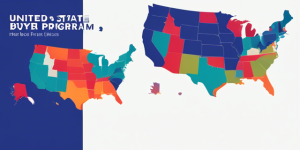
First Time Home Buyer Programs by state
The Kansas Housing Resources Corporation offers two key programs:
Kansas Homeownership Opportunities Program
This program provides first mortgage financing at below market interest rates. No down payment help is included, but the lower rates help first time buyers.
Mortgage Credit Certificate (MCC) Program
Kansas’ MCC program issues federal tax credits up to $2,000 annually based on your mortgage interest. The credits effectively lower your income tax bill each year. To qualify, buyers must meet income and purchase price requirements.
Additionally, certain cities and counties in Kansas have local funds to assist first time purchasers. Ask potential lenders to see if you may qualify for any combined state and local assistance.
]]>